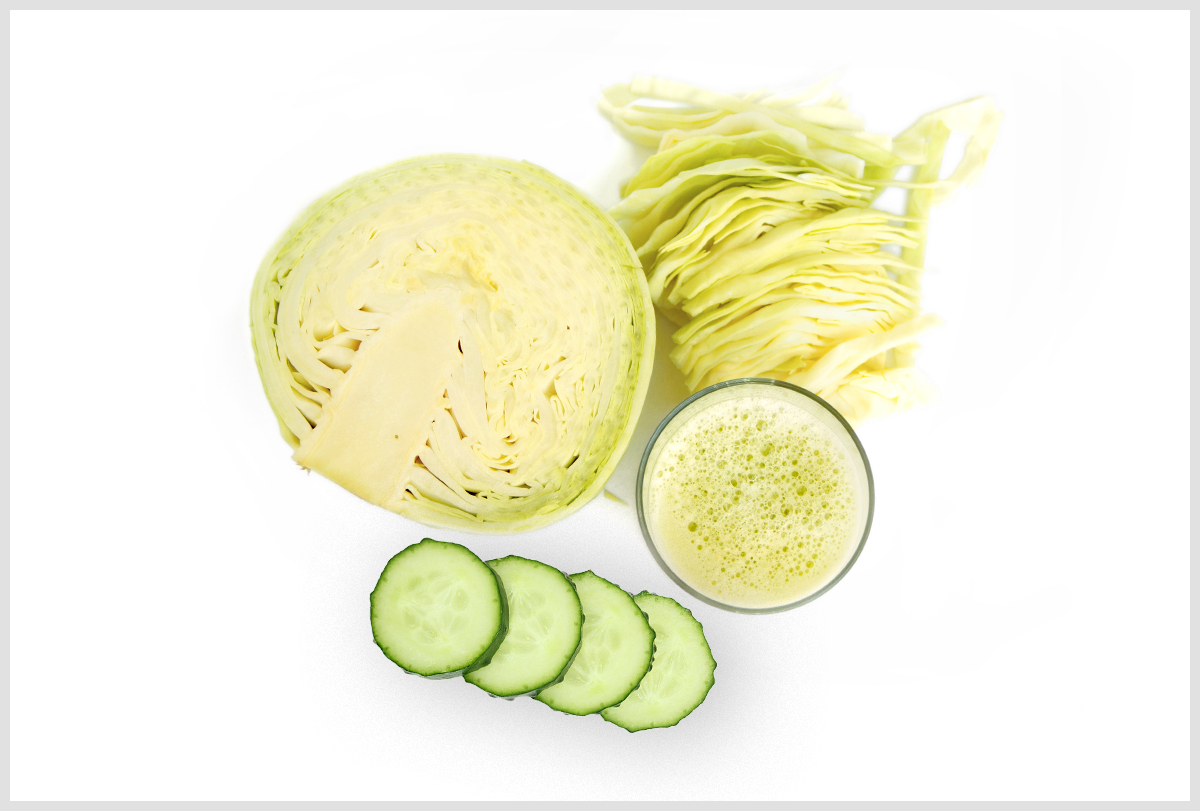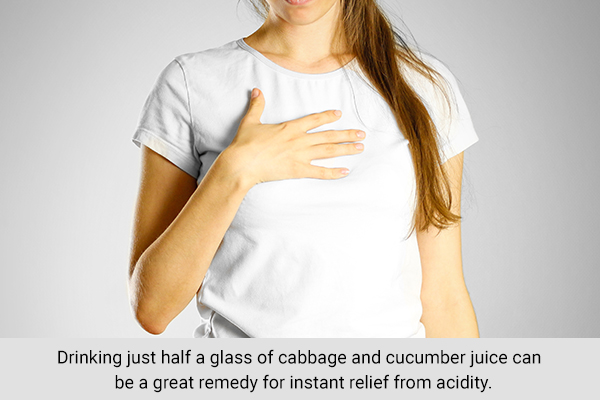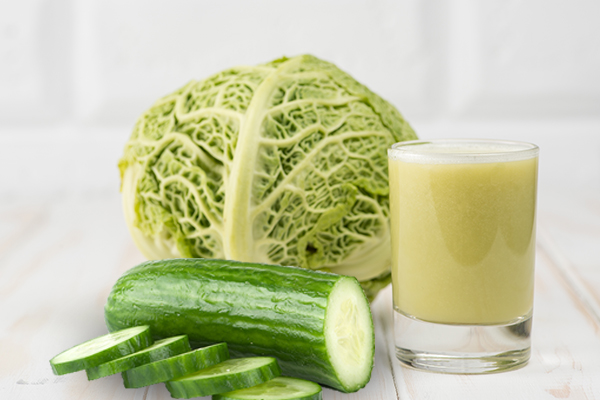In this article:
Juicing vegetables is not a new concept. In fact, some experts recommend adding vegetables to the diet to make up for the 4–5 servings of vegetables.

Carrot juice, beetroot juice, and celery juice are the popular juices being consumed, but cucumber and cabbage juice is becoming the new health tonic among wellness enthusiasts.
Is cucumber and cabbage juice truly beneficial enough to warrant adding it to your diet? This article will take a deep dive into the health benefits of drinking cucumber and cabbage juice and the nutritional value of both ingredients.
Health Benefits of Drinking Cucumber and Cabbage Juice
Drinking cucumber and cabbage juice offer the following health benefits.
1. Relieves heartburn

Cabbage juice has been used for a very long time to treat peptic ulcers and excessive acid due to an H. pylori infection. (1)
Studies have found cucumber to have a highly neutralizing effect on stomach acids and a useful remedy for acid reflux. (2)
Drinking just half a glass of cabbage and cucumber juice can therefore be a great remedy for instant relief from acidity.
2. Detoxifies the body
Both cucumber and cabbage are effective detoxifying agents of the body.
Cucumber was specifically effective in removing accumulated toxins in the body, (3) and heat-treated cucumber juice also aids in liver detoxification from alcohol. (4) In addition, cabbage juice reduced kidney injury caused by heavy metals and is useful for flushing toxins from the organ. (5)
Cucumber is also found to aid liver detoxification by supporting the enzymes that are involved in detoxification pathways and aid in the removal of its toxins. (6)
3. Boosts immunity
Vegetables are replete with vitamins and minerals that help boost immune functions. Cabbage and cucumber are no different.
In addition to being rich in vitamin C, which is effective in boosting the body’s immune response, cabbage also has potent anti-inflammatory compounds that aid in improving the body’s immune response.
In a study of cabbage extracts for dermatitis, an inflammatory skin condition, cabbage reduced not only inflammation but also the levels of immune cells, thus improving the overall outcome of inflammation. (7)
In animal studies, cabbage also improved the response to foreign bacteria, which led to reduced risk of infection. (8)
Cucumber is also antimicrobial and helps fight against foreign microbes in the body. (9)
4. Supports skin health

Cabbage juice reduces inflammation and is useful for skin conditions such as dermatitis, (7) and the nutrients in cabbage such as vitamin C and selenium improve the skin’s texture and appearance. They boost collagen production to reduce fine lines, as well as reduce hyperpigmentation by reducing the production of melanin. (10)
No one is a stranger to the use of cucumber in spas and facials. It is considered a superfood for skin health. The vitamins A and C in cucumber moisturize the skin, reduce oil secretion, soothe the skin, and reduce the production of melanin. (11)
Adding one serving (200 ml) of cucumber and cabbage juice to the diet can be helpful for health, but you can also use it as a toner or face spray.
5. May support bone health
It would seem surprising that vegetables such as cabbage and cucumber could improve bone health, but the addition of vegetables is actually very good for your bones.
Cabbage contains calcium, which is important for bone health. Moreover, vegetables have an alkalizing effect on the body, which means they reduce the acid load. This is important in managing the sodium–potassium balance; it reduces muscle wasting and bone loss. (12)
6. May aid in managing blood pressure
Cabbage is an effective vegetable to include in the management of blood pressure. Studies have found cruciferous vegetables such as cabbage to effectively reduce blood pressure and the risk of heart disease. (13)
Cucumber juice has been found to be effective in reducing blood pressure due to its rich potassium content. It also improves blood flow and brings about calmness. (14)
How to Make Cucumber and Cabbage Juice

- Wash and dice a handful of cabbage leaves.
- Wash and dice 1 whole cucumber.
- Optionally, you can dice an apple to sweeten the juice.
- Blend them well together and strain to remove the pulp.
- You can add lemon juice or a pinch of Himalayan salt to improve the taste.
Nutritional Profile of Cabbage and Cucumber
Cabbage contains many essential nutrients. About 100 g of raw cabbage gives you the following daily requirements: (15)
- 3% of calcium
- 4% of potassium
- 11% of folate
- 41% of vitamin C
- 63% of vitamin K
Cucumber, on the other hand, is a rich source of electrolytes and can help maintain fluid balance in the body. Just 1 cucumber gives you the daily requirements of the following nutrients: (16)
- 6% of vitamin B5
- 4% of vitamin B6
- 5% of folate
- 5% of vitamin C
- 8% of vitamin K
- 10% of copper
- 4% of potassium
Precautions to Consider
People with an underactive thyroid (hypothyroidism) need to avoid raw cabbage and its juice as they contain goitrogens, which can lower TSH levels and worsen symptoms. (17)
In addition, the high vitamin K content in cabbage can interfere with blood-clotting medications; thus, people on these drugs need to avoid the intake of cabbage.
Most-Asked Questions
How often can I drink this juice?
You can have 1 serving (200 ml) of this juice daily.
What time of the day should I drink this juice?
You can have this juice in the morning on an empty stomach or at least 30 minutes before meals to maximize the absorption of nutrients. This will also benefit people who suffer from acidity.
Final Word
Cucumber and cabbage juice sounds unconventional as vegetable juices. However, they offer a variety of health benefits including boosting immunity, supporting skin health, reducing blood pressure, and most of all detoxifying the body by aiding the detoxification pathways of the liver and kidneys.
- Was this article helpful?
- YES, THANKS!NOT REALLY


